Dive into the captivating journey of the Egyptian flag, tracing its evolution from ancient emblems to the iconic modern tricolor design. Each stripe symbolizes unity, resilience, and Pan-Arab identity, reflecting Egypt's rich history and enduring pride on the world stage.
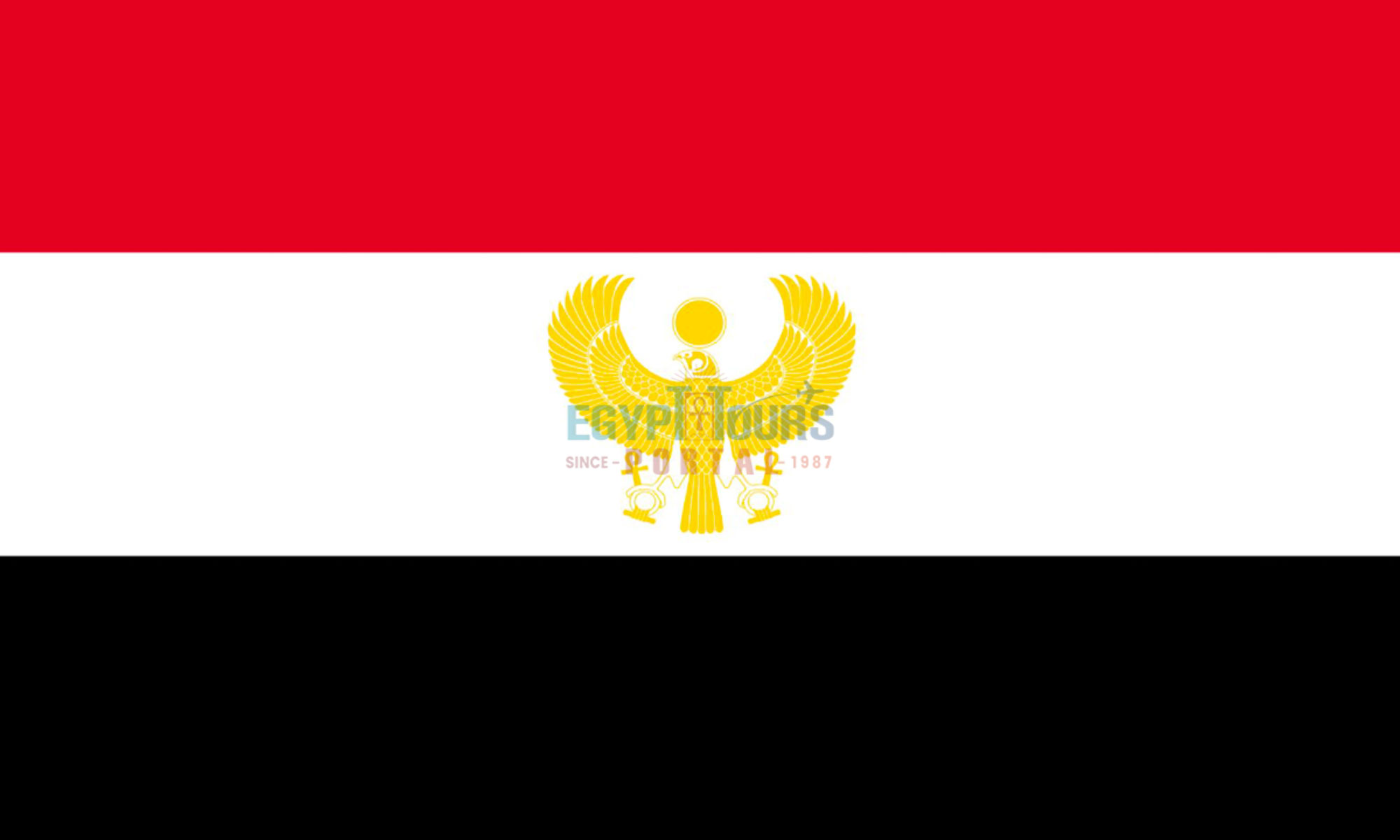
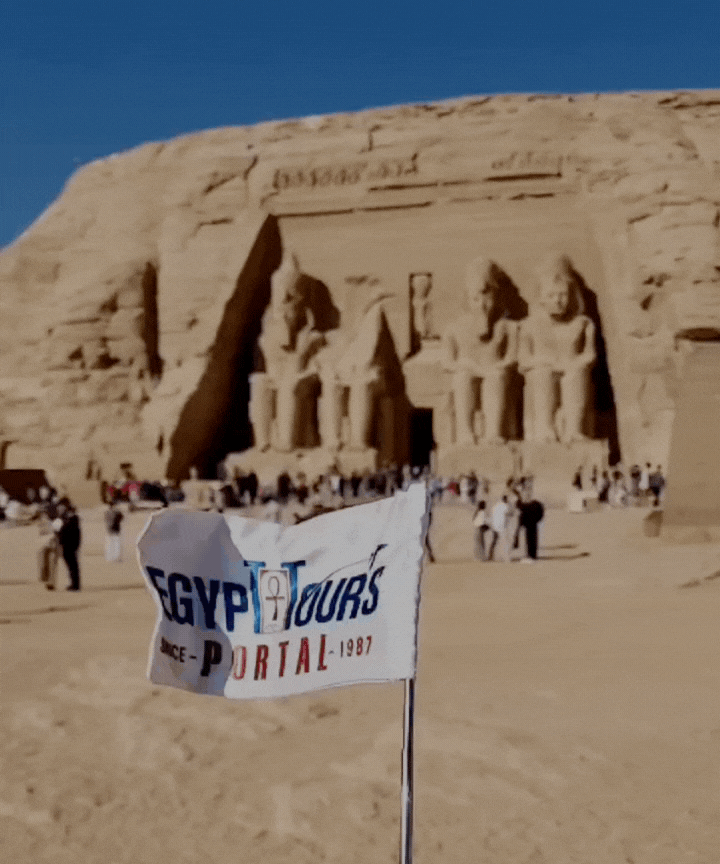
The Egyptian flag is not just a national symbol but a reflection of Egypt’s storied past, cultural evolution, and aspirations for the future. From the standards carried by ancient pharaohs to the modern tricolor flag representing national pride and Pan-Arab unity, the flag encapsulates the spirit of a civilization that has shaped human history for millennia. This article delves into the flag’s transformation, from ancient emblems to the modern banner, exploring its historical, cultural, and political significance.

The standards and Banners of the Ancient Egyptian flag as we know it today did not exist. Instead, the Egyptians used standards, banners, and ceremonial emblems for similar purposes. These items were displayed during ceremonies, carried into battle, and used in religious rituals to signify identity, power, and a connection to the divine.
With the bright colors and unique symbols of the ancient Egyptian flags, Everyone could get a clear idea of the power and grace of the powerful and divine ancient Egyptian civilization.
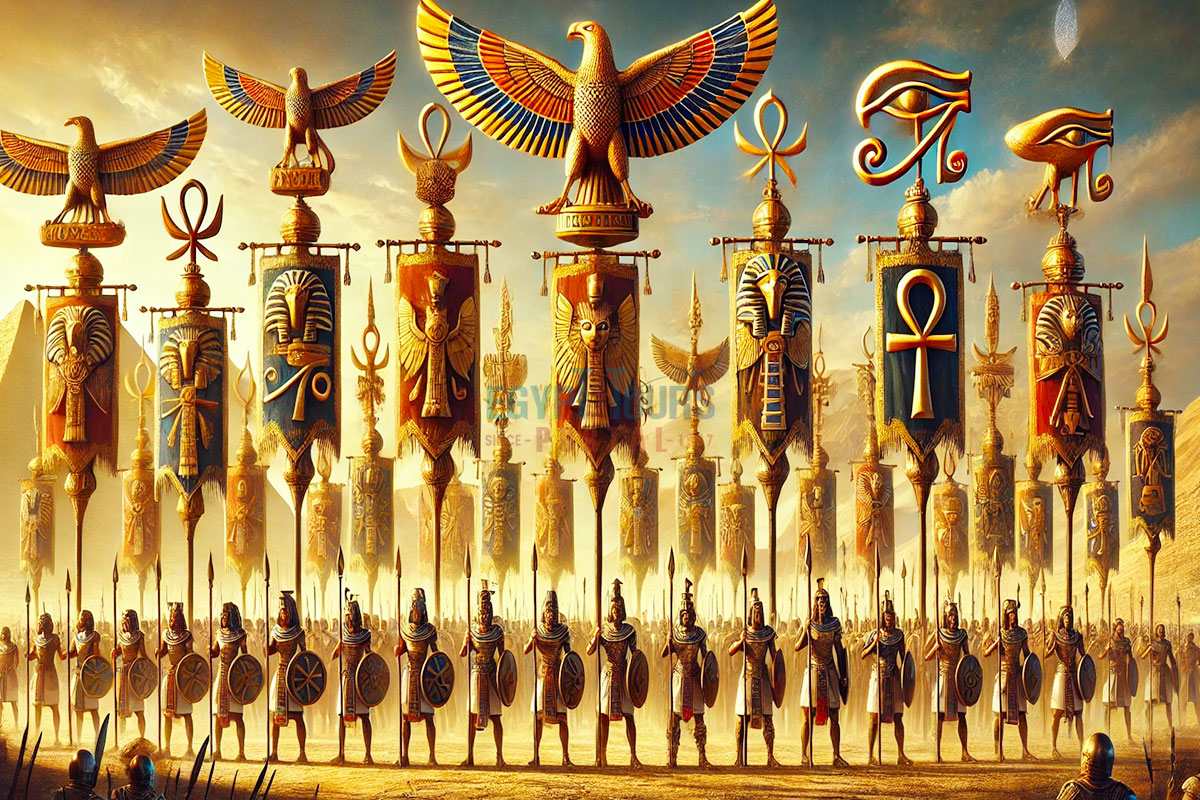
Ancient Egyptian military banners were crucial in organizing troops and maintaining order on the battlefield. Each military unit carried a unique standard that acted as both a practical tool and a symbol of allegiance.
Military standards were not just practical; they inspired morale and a sense of duty, reminding soldiers of their connection to the gods and their mission to protect Egypt.
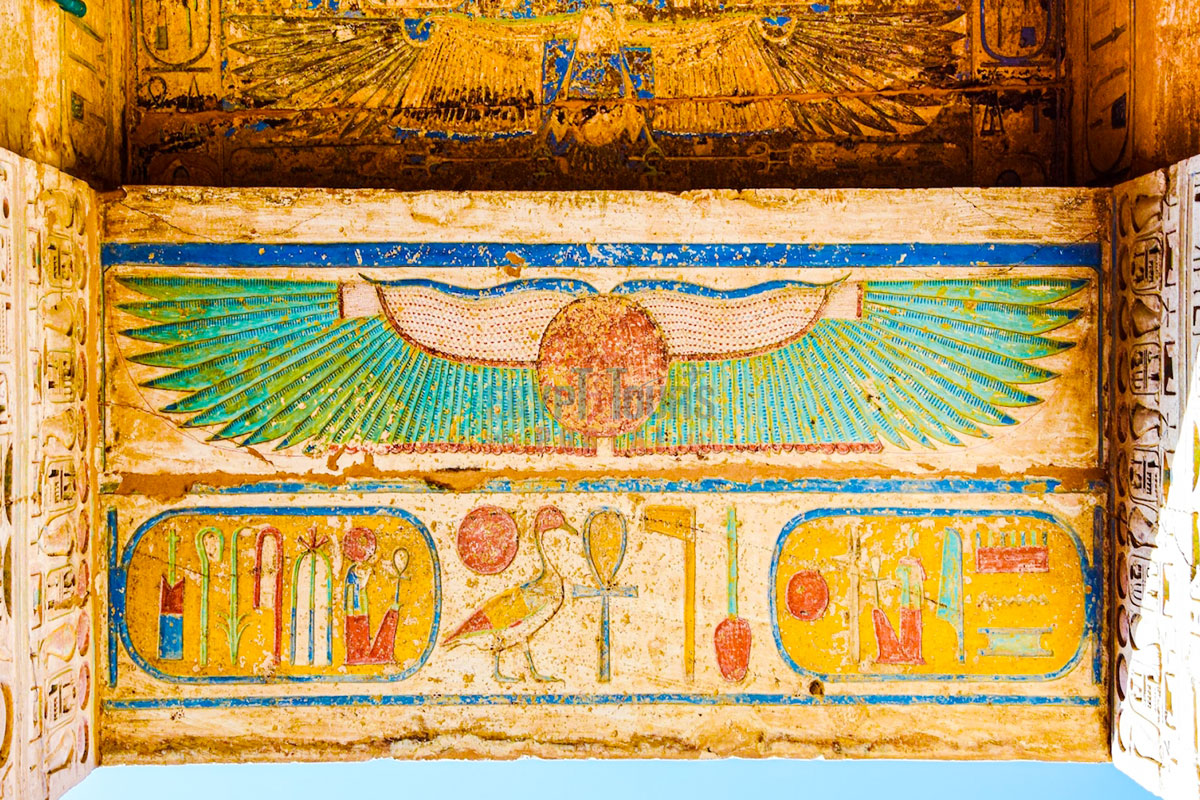
Ancient Egyptian Religion permeated every aspect of their life, including their banners and emblems. These symbols were conduits for divine power, believed to protect and guide the people during important events.
These symbols often adorned banners, connecting the people to their gods and reinforcing the belief in divine intervention.
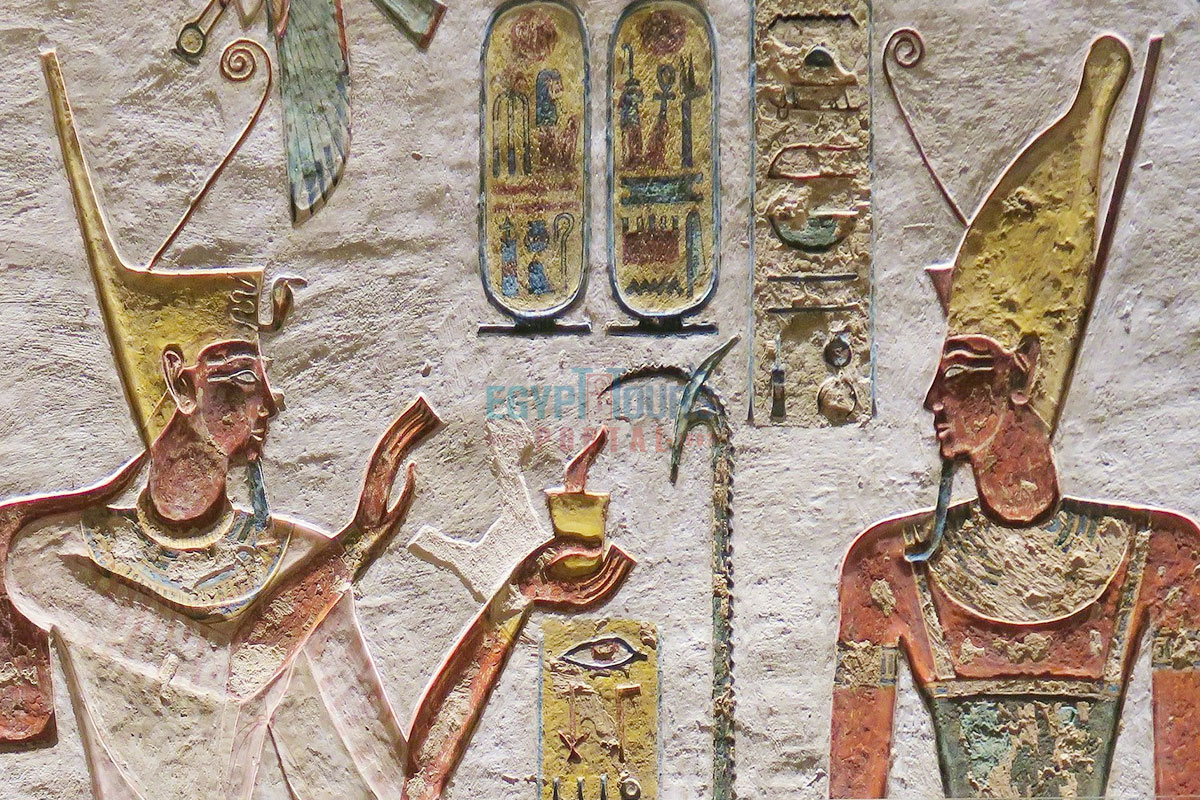
Emblems and insignias were a cornerstone of Egypt’s royal and religious identity. These symbols communicated complex ideas about authority, divinity, and cultural values.
These emblems were prominently displayed on temples, palaces, and military standards, asserting the pharaoh’s divine legitimacy and political authority.
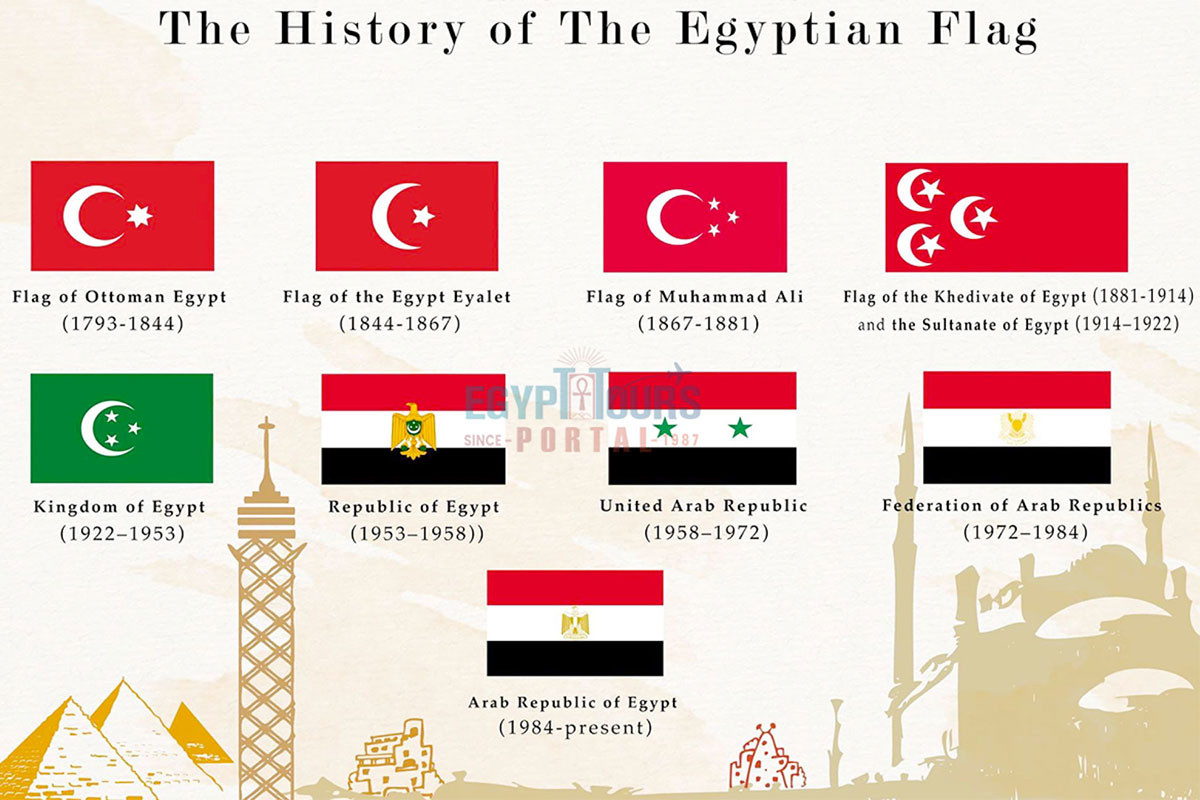
The history of the Egypt flag is deeply intertwined with the nation’s identity, independence, and the broader political movements in the Arab world. Over the centuries, the design of the flag has evolved, reflecting Egypt’s changing rulers, national aspirations, and its role in regional history.
During the Ottoman rule (1517–1798), Egypt did not have its national flag. Instead, the Ottoman Empire’s flag—a red banner with a white crescent and star—was flown over Egypt. This period marked Egypt’s status as a province under Ottoman sovereignty, with no unique emblem to represent its identity.
In 1805, under the rule of Muhammad Ali Pasha, Egypt gained considerable autonomy. By 1826, a red flag with three white crescents and three stars was introduced, symbolizing Muhammad Ali’s ambitions and the inclusion of Egypt, Sudan, and Hejaz under his governance. This flag marked the first semblance of an Egyptian identity.
During the British occupation (1882–1922), Egypt’s flag saw minimal changes. The primary flag remained the red banner from the Muhammad Ali period. However, in 1914, when Egypt became a British protectorate, the Union Jack often overshadowed local symbols.
In 1922, Egypt declared independence, forming the Kingdom of Egypt under King Fuad I. A new flag was adopted in 1923, featuring a green background with a white crescent and three stars. The stars represented Egypt’s Muslim, Christian, and Jewish communities, reflecting the country’s cultural and religious diversity.
The most significant change in the flag’s history came after the 1952 Egyptian Revolution, which ended the monarchy and established the Republic of Egypt. The new national flag adopted in 1958 featured red, white, and black horizontal stripes with an eagle in the center. This was part of a broader Pan-Arab movement that sought unity among Arab nations, with Egypt leading the charge.
The current flag of Egypt was officially adopted in 1984. It retains the horizontal tricolor of red, white, and black but replaces the eagle with the Eagle of Saladin, a golden emblem in the center. This eagle symbolizes strength, sovereignty, and a connection to Egypt’s illustrious past under Saladin, a revered 12th-century leader who defended the region against the Crusaders.

The Egypt flag is more than just a national symbol—it embodies the country’s rich history, aspirations for freedom, and its leadership role in the Arab world. Each element of the flag carries profound significance, blending historical, cultural, and political meaning.
The Egyptian flag features three horizontal stripes: red, white, and black. These colors are part of the Pan-Arab colors, which symbolize the shared heritage and unity of Arab nations.
The top red stripe represents the struggle and sacrifices made during Egypt’s fight against colonization and oppression. It also signifies the blood of the martyrs who fought for independence and justice.
The middle white stripe symbolizes peace and a bright future for the nation. It reflects the hope for progress and the non-violent transition during the 1952 Revolution, which brought significant change without widespread bloodshed.
The bottom black stripe signifies the end of Egypt’s oppression under colonization. It represents the overcoming of hardship and the triumph over injustice.
At the center of the white stripe is the Eagle of Saladin, a golden emblem that holds a shield and a scroll bearing the phrase "Arab Republic of Egypt" in Arabic. The eagle is a powerful symbol of pride, strength, and unity. It also serves as a connection to Egypt’s medieval past, particularly the leadership of Saladin, who is celebrated as a symbol of justice and courage.
The Egyptian flag’s Pan-Arab colors—red, white, black, and gold—connect Egypt to the broader Arab world. Shared with nations like Iraq, Syria, and Yemen. This connection reinforces Egypt’s leadership role in the Arab League and its solidarity with neighboring Arab nations.
For modern Egyptians of all ages, the flag is a source of immense pride, flown during national celebrations, sports events, and political milestones. It serves as a constant reminder of the sacrifices made by past generations and the aspirations for a brighter, unified future.
With its rich history and deep symbolism, the Egyptian flag is a testament to the nation’s resilience, unity, and cultural heritage. From ancient banners carried into battle to the modern tricolor banner adorned with the Eagle of Saladin, the flag reflects Egypt’s evolution through the ages.
It stands as a beacon of national pride, a symbol of liberation, and a reminder of the nation’s enduring legacy in the tapestry of human history. The pride and beauty of ancient Egypt walk hand in hand, so book your favorite tour of our magical Nile Cruises or Egypt Vacations to live your dream vacation among all the majestic destinations of Egypt.
To fully comprehend the pride modern Egyptians have for their heritage and have your chance to discover the legacy of this immortal civilization, then our incredible classic Egypt tours are waiting for you.
Private 4 Days Cairo Tour Packages for Australian Travelers 4 days Cairo Egypt Tour ...
Tour Location: Cairo – Giza...
5 Days Cairo and Alexandria Tour Package For Australian Travelers 5 days Cairo and A...
Tour Location: Cairo/Giza/Alexandria...
6 Days Cairo, Luxor & Aswan Tour Package For Australian Travelers 6 days Cairo, ...
Tour Location: Cairo/Giza/Aswan/Luxor...
Amazing 7 Days Cairo and Hurghada Holiday for Australian Travelers 7 Days Cairo &...
Tour Location: Cairo – Giza – Hurgh...
It features horizontal bands of red, white, and black, with the golden Eagle of Saladin in the center.
While not fabric flags, ancient Egypt used standards and banners adorned with symbols of gods, animals, and pharaohs.
Symbols included the ankh, scarab beetle, Horus falcon, and sun disks.
The Eagle of Saladin represents strength, sovereignty, and Egypt’s leadership in the Arab world.
It was adopted in 1984.
To symbolize unity among Arab nations and shared historical struggles.
It was a red flag with three white stars and crescents, representing Egypt’s ties to the Ottoman Empire.
Yes, it has evolved to reflect Egypt’s political transitions and Pan-Arab identity.
It reads "Arab Republic of Egypt".
Military and government entities may display flags with specific insignias for official use.
Yes, it shares similarities with flags of other Arab nations due to the Pan-Arab color scheme.
It is widely displayed on government buildings, schools, embassies, and during national holidays and celebrations.
The entire country of Egypt deserve to be explored with its every heavenly detail but there are places that must be seen before any other such as the breathtaking Hurghada's red sea, The wonders of Cairo the pyramids of Giza, the great sphinx, the Egyptian Museum, Khan El Khalili Bazaar, the wonders of Luxor like Valley of the Kings, Karnak & Hatshepsut temple and the wonders of Aswan such as Abu Simbel temples, Philea temple, Unfinished obelisk and The Wonders of Alexandria like Qaitbat Citadel, Pompey's Pillar and Alexandria Library. Read more about the best places to visit in Egypt.
If you want to apply for a Visa On Arrival that lasts for 30 days then you should be one of the eligible countries, have a valid passport with at least 6 months remaining and pay 25$ USD in cash, as for the E-Visa for 30 day you should have a valid passport for at least 8 months, complete the online application, pay the e-visa fee then print the e-visa to later be presented to the airport border guard. You could also be one of the lucky ones who can obtain a free visa for 90 days. Read more about Egypt travel visa.
Egypt has a variety of delicious cuisines but we recommend “Ful & Ta’meya (Fava Beans and Falafel)”, Mulukhiya, “Koshary”, a traditional Egyptian pasta dish, and Kebab & Kofta, the Egyptian traditional meat dish.
The best time to travel to Egypt is during the winter from September to April as the climate becomes a little tropical accompanied by a magical atmosphere of warm weather with a winter breeze. You will be notified in the week of your trip if the Climate is unsafe and if any changes have been made.
You should pack everything you could ever need in a small bag so you could move easily between your destinations.
We have been creating the finest vacations for more than 20 years around the most majestic destinations in Egypt. Our staff consists of the best operators, guides and drivers who dedicate all of their time & effort to make you have the perfect vacation. All of our tours are customized by Travel, Financial & Time consultants to fit your every possible need during your vacation. It doesn't go without saying that your safety and comfort are our main priority and all of our resources will be directed to provide the finest atmosphere until you return home.
You will feel safe in Egypt as the current atmosphere of the country is quite peaceful after the government took powerful measures like restructuring the entire tourist police to include all the important and tourist attractions in Egypt. Read more about is it safe to travel to Egypt.
Wear whatever feels right and comfortable. It is advised to wear something light and comfortable footwear like a closed-toe shoe to sustain the terrain of Egypt. Put on sun block during your time in Egypt in the summer to protect yourself from the sun.
The best activity is by far boarding a Nile Cruise between Luxor and Aswan or Vise Versa. Witness the beauty of Egypt from a hot balloon or a plane and try all the delicious Egyptian cuisines and drinks plus shopping in old Cairo. Explore the allure and wonders of the red sea in the magical city resorts of Egypt like Hurghada and many more by diving and snorkeling in the marine life or Hurghada. Behold the mesmerizing western desert by a safari trip under the heavenly Egyptian skies.
There are a lot of public holidays in Egypt too many to count either religious or nation, the most important festivals are the holy month of Ramadan which ends with Eid Al Fitr, Christmas and new years eve. Read more about festivals & publich holidays in Egypt.
Egypt is considered to be one of the most liberal Islamic countries but it has become a little bit conservative in the last couple of decades so it is advised to avoid showing your chest, shoulders or legs below the knees.
Arabic is the official language and Most Egyptians, who live in the cities, speak or understand English or at least some English words or phrases. Fewer Egyptians can speak French, Italian, Spanish, and German. Professional tour guides, who work in the tourism sector, are equipped to handle visitors who cannot speak Arabic and they will speak enough English and other languages to fulfill the needs of all our clients.
The fastest way is a car, of course, a taxi. If you are in Cairo ride a white taxi to move faster or you could board the fastest way of transportation in Egypt metro if the roads are in rush hour.
The temperature in Egypt ranges from 37c to 14 c. Summer in Egypt is somehow hot but sometimes it becomes cold at night and winter is cool and mild. The average of low temperatures vary from 9.5 °C in the wintertime to 23 °C in the summertime and the average high temperatures vary from 17 °C in the wintertime to 32 °C in the summertime. The temperature is moderate all along the coasts.
It is the home of everything a traveler might be looking for from amazing historical sites dating to more than 4000 years to enchanting city resorts & beaches. You will live the vacation you deserve as Egypt has everything you could possibly imagine.









